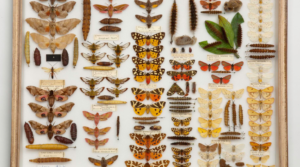
Isla Gladstone, Senior Collections Officer – Natural Sciences, Bristol Museums, shares her thoughts on our collaborative project Setting Natural Sciences Collections Data Free…
At a time when many museums are working to respond to the environmental crisis, we are creating opportunities to harness the power of regional natural science collections. We are doing this by helping to develop a UK digitisation infrastructure, which will be accessible to all sizes of heritage organisations.
Regional institutions across the UK hold significant natural science collections, providing unique windows into the natural world. However, their valuable data is often not accessible for global research because it is not available digitally.
Our previous project to map and support regional skills for natural science collections in the UK’s South West region, the ‘South West Area Natural Science collections’ (SWANS) project, highlighted many unique collection stories. Examples include local botanical collections of pressed ferns, seaweeds and other plants dating from the late 1700s; nationally important Ice Age fossils; and specimens collected on early expeditions to Antarctica or Australia.
During SWANS, we found that regional institutions with no natural science specialist were keen to digitise these collections and use them to explore environmental issues with their communities, but often did not feel confident to do this. Through this collaboration with Bristol Museums (Bristol Cultural & Creative Industries) and Natural History Museum London (NHM London), we aim to develop workflows, training and resources to support digitisation of insect and plant collections in regional settings. We also hope to draw on regional colleagues’ expertise in engaging with their communities and highlight stories of significant local collections, to show the value of two-way collaboration in developing a national infrastructure.
Bristol’s own natural science collections are amongst the UK’s largest and most significant, with over 1.35 million specimens. However, very few are digitised. In this pilot project, we will be digitising a small portion of our rich botanical collections, which contain approximately 55,000 pressed plants. Through this work, we will be consolidating our own practice so that we can support colleagues in our region, as well as explore links to research and engagement including through Bristol’s One City Ecological Emergency Strategy.
The breadth and diversity of regional museums, with their combined function of caring for specimens with data and as publicly accessible spaces, represents a fantastic research and engagement resource for the UK. We are grateful to Bristol Cultural & Creative Industries and NHM London for this collaboration, as well as the Arts and Humanities Research Council who are funding it.
Read more about Setting Natural Sciences Collections Data Free here.
